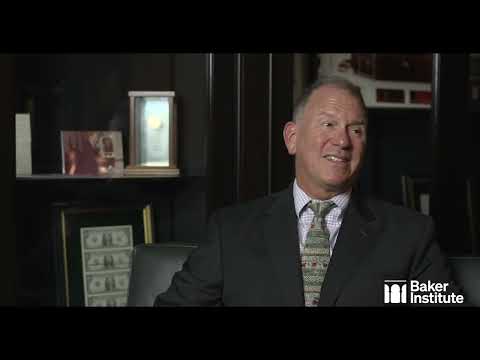Biography
Mark Finley is the fellow in energy and global oil at Rice University’s Baker Institute. He has over 35 years of experience working at the intersections of energy, economics and public policy.
Before joining the Baker Institute, Finley was the senior U.S. economist at BP. For 12 years, he led the production of the BP Statistical Review of World Energy, the world’s longest-running compilation of objective global energy data. He also was responsible for the company’s long- and short-term oil market analysis, and he led the global oil market and transportation sector analyses for the long-term BP Energy Outlook.
Prior to joining BP, Finley was an analyst and manager at the U.S. Central Intelligence Agency. He was responsible for assessing the implications for U.S. strategic interests of developments in global oil and other energy markets, as well as analyzing the policies of key oil-producing and -consuming countries. He was recognized for exceptional analytic performance many times, including for oil market analysis during 1990-91 Gulf War. Finley also edited a daily intelligence summary for Cabinet-level U.S. economic policymakers as well as the president’s daily brief, and regularly briefed these summaries and other analysis to senior U.S. officials.
Finley is a senior fellow of the U.S. Association for Energy Economics, and has been recognized for his lifetime contributions to the profession of energy economics. He has held leadership roles in the International Association for Energy Economics, the National Association for Business Economics, and the Conference of Business Economics, and is a member of the Council on Foreign Relations. Finley is a Phi Beta Kappa graduate of the University of Michigan and holds graduate degrees from Northwestern University (in economics) and the George Washington University (in finance).
Contact at [email protected] or 713-348-2217.
Recent Publications
In Marketpalce: What goes into OPEC's decision-making?
“Price is always in the background as part of the discussion,” said Finley. The OPEC+ members will decide whether to continue voluntarily cutting production by about 2 million barrels per day. “They have influence but not control over the price."
In Marketplace: Hurricanes threaten oil and gas production
With a record number of hurricanes expected this season, the oil and gas industry is particularly at risk. “The Gulf Coast by itself has about half of America’s total refining capacity,” said Finley. "Gulf Coast refineries are also the reason why the United States is the largest exporter of refined products like gasoline and diesel fuel on the planet."
Why the U.S. is a Spoiler for OPEC’s Plan to Raise Oil Prices
OPEC hasn’t been able to exert more control over oil prices partly because of competition from the U.S., said fellow Mark Finley. “The United States, on the back of the shale revolution, has become the biggest producer of oil in the world.”







Book Chapters
External Publications
Interviews
Presentations